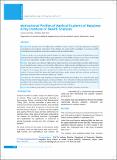Please use this identifier to cite or link to this item:
https://hdl.handle.net/20.500.14356/1640Full metadata record
| DC Field | Value | Language |
|---|---|---|
| dc.contributor.author | Shrestha, Lochana | - |
| dc.contributor.author | Pant, Shambhu Nath | - |
| dc.date.accessioned | 2023-05-17T06:45:54Z | - |
| dc.date.available | 2023-05-17T06:45:54Z | - |
| dc.date.issued | 2017 | - |
| dc.identifier.citation | ShresthaL., & PantS. N. (2018). Motivational Profiles of Medical Students of Nepalese Army Institute of Health Sciences. Journal of Nepal Health Research Council, 15(3), 252-257. https://doi.org/10.33314/jnhrc.v15i3.1170 | en_US |
| dc.identifier.issn | Print ISSN: 1727-5482; Online ISSN: 1999-6217 | - |
| dc.identifier.uri | http://103.69.126.140:8080/handle/20.500.14356/1640 | - |
| dc.description | Original Article | en_US |
| dc.description.abstract | Abstract Background: Students enter the medical study with different types of motives. Given the importance of academic motivation for good academic achievement of the students, the present study was designed to reveal the possible relationship between academic motivation and achievement in medical students. Methods: In this cross-sectional study medical students (N=364) of Nepalese Army institute of Health Sciences were participated and classified to different subgroups using intrinsic and controlled motivation scores. Cluster membership was used as an independent variable to assess differences in study strategies and academic performance. Results: Four clusters were obtained: High Intrinsic High Controlled, Low Intrinsic High Controlled, High Intrinsic Low Controlled, and Low Intrinsic Low Controlled. High Intrinsic High Controlled and High Intrinsic Low Controlled profile students constituted 36.1%, 22.6% of the population, respectively. No significant differences were observed as regards to deep strategy and surface strategy between high interest status motivated and high interest-motivated students. However, both of the clusters had significantly deeper, surface strategy and better academic performance than status-motivated and low-motivation clusters (p < 0.001). Conclusions: The interest status motivated and interest-motivated medical students were associated with good deep and surface study strategy and good academic performance. Low-motivation and status-motivated students were associated with the least academic performance with less interest learning behaviors. This reflected that motivation is important required component for good learning outcomes for medical students Keywords: Academic performance; controlled motivation; clusters; intrinsic motivation; motivation. | en_US |
| dc.language.iso | en | en_US |
| dc.publisher | Nepal Health Research Council | en_US |
| dc.relation.ispartofseries | Sep-Dec, 2017;1170 | - |
| dc.subject | Academic performance | en_US |
| dc.subject | Controlled motivation | en_US |
| dc.subject | Clusters | en_US |
| dc.subject | Intrinsic motivation | en_US |
| dc.subject | Motivation | en_US |
| dc.title | Motivational Profiles of Medical Students of Nepalese Army Institute of Health Sciences | en_US |
| dc.type | Journal Article | en_US |
| local.journal.category | Original Article | - |
| Appears in Collections: | Vol. 15 No. 3 Issue 37 Sep-Dec 2017 | |
Files in This Item:
| File | Description | Size | Format | |
|---|---|---|---|---|
| 1170-Manuscript-3068-1-10-20180101.pdf | Fulltext Download | 206.94 kB | Adobe PDF |  View/Open |
Items in DSpace are protected by copyright, with all rights reserved, unless otherwise indicated.
